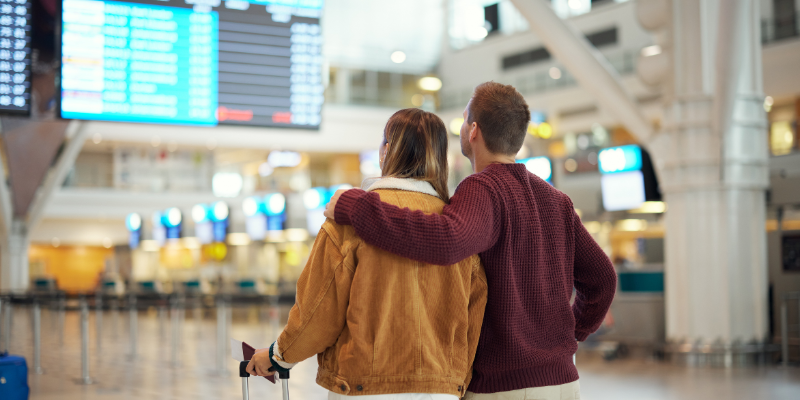Top 10 First-Time International Travel Tips | Beginner’s Guide

Are you embarking on your first international travel journey? Traveling abroad for the first time is like going into a world of adventure and novel experiences. But, there’s a potential that challenges may come along with all the excitement, leaving you feeling a little overwhelmed.
Fear not, curious globetrotter! I’ve got some essential international travel tips to help you conquer those challenges and make your first international adventure smooth and unforgettable. Dust off that passport, pack your sense of wonder and soak in these international travel tips.
Prepare to discover successful marketplaces and peaceful temples related to those of an expert global tourist.
QUESTIONS TO ASK BEFORE TRAVELING ABROAD
First-Time International Travel Checklist

Congratulations on your first international travel tip! Traveling internationally for the first time can be exciting and sometimes overwhelming. Here’s a checklist to help you stay organized and ensure you have everything you need:
1- Important Documents for International Travel
One of the foremost considerations for a seamless international trip is ensuring your travel documents are in order. Remember to consider the importance of a valid passport and any required travel visas. Here’s what you need to know:
Passport and Visas

Make sure your passport will remain valid for a minimum of six months after the date you want to return. Additionally, check whether you need a visa for entry into your destination country. Some countries offer visa-free entry, while others may require advance visa approval.
2- Destination Research
Taking the time to research your destination is key to making the most out of your trip. While spontaneous travel might seem thrilling, it’s smart to do some homework before you go.
Note: Did you hear that Singapore has a legal ban on chewing gum? Or that feeding pigeons in Venice is a no-no? And in Scotland, it’s actually illegal to ride a cow while drunk!
Every country has its own set of rules, some of which might seem strange because they’re tied to different cultures. Getting to know these rules before you go can help you steer clear of any problems.
3- Finance for International Travel
For smooth finances during travel, inform your bank of your trip dates, carry a mix of local cash and cards, be aware of exchange rates for better value, use local ATMs wisely, and keep an emergency backup of a spare card and extra cash.
Stay informed about your transactions, ensuring a stress-free and enjoyable journey.
5- Flight Transportation and Accommodation

For a successful first international trip, carefully plan transportation and accommodation. Research and book flights early, considering travel restrictions.
Explore accommodation options based on location, amenities, and budget using online platforms. Create a detailed itinerary, considering factors like currency exchange and local customs, to ensure a stress-free experience.
Navigating Transportation
Research transportation modes like buses, trains, and planes using platforms like Rio2Rome and 12Go. Local transportation options such as subway systems can offer budget-friendly and eco-conscious choices.
Strategic Accommodation Choices
Beyond hotels, explore alternatives like hostels and Airbnb. Boutique hostels can provide amenities comparable to budget hotels. Investigate sites like Hostelz.com to find the best deals and book directly for cost savings.
6- Travel Insurance for Travelling Abroad
Travel insurance safeguards you from financial woes during trips, covering trip cancellations, medical emergencies, and more. Consider factors like destination, health, and activities to decide if you need it.
It’s wise for remote trips or risky adventures, but even domestic trips can benefit from this safety net.
Remember to compare policies and understand the coverage details before buying.
7- Health Preparations
Health preparation for international travel involves researching destination-specific health risks, getting required vaccinations, and consulting with a healthcare professional.
Additionally, it’s crucial to gather international travel tips to enhance your overall travel preparedness. Pack a travel health kit with essential medications, familiarize yourself with local healthcare facilities, and stay informed about food and water safety.
These measures ensure a safer and more enjoyable travel experience.
8- Secure Bookings in Advance
To ensure a smooth and stress-free travel experience, it is advisable to secure accommodations and transportation in advance. While the spontaneity of last-minute bookings may seem appealing, it often leads to limited options and higher costs.
Planning and booking ahead not only provide better deals but also contribute to a more relaxed and enjoyable journey, allowing you to focus on the exploration of new destinations rather than worrying about arrangements.
9- Combat Travel Fatigue
Combat travel fatigue refers to the physical and mental exhaustion experienced by individuals who frequently travel for combat or military purposes.
This type of fatigue can result from long deployments, constant movement between different locations, exposure to high-stress environments, and irregular sleep patterns.
Recognizing the importance of addressing combat travel fatigue is crucial for maintaining the readiness and effectiveness of military forces operating in challenging and demanding environments
Strategies to Combat Travel Fatigue
10- Safety Precautions for First International Travel
Safety is paramount during your travels. Stay vigilant and take precautionary measures:
Travel Safety Guidelines
Protect your belongings from pickpockets using crossbody bags and fanny packs. Share your itinerary with loved ones, and consider registering with your country’s embassy for emergencies. Invest in travel insurance to safeguard against unexpected events.
11- Packing Essentials for First Time International Travel
Packing efficiently contributes to a smooth travel experience. Organize your belongings using packing cubes and maintain a balance between essentials.
Remember, traveling light is vital; overpacked luggage can be cumbersome. Keep valuable items secure and use locks when necessary.
Essentials for Carry-On:

- Change of clothes: Pack an outfit in case your checked luggage gets delayed.
- Toiletries: Travel-sized versions of essentials like toothbrushes, toothpaste, face wash, and moisturizer.
- Medications: Pack any prescribed medications and over-the-counter drugs you might need.
- Entertainment: Book, and download movies/music, or games for the flight.
- Documents: Keep copies of your passport, visa, and travel insurance easily accessible.
12- Cultural Research for International Travel
When conducting international travel tip culture research for your trip, consider the following key aspects:
12- Familiarize Yourself with Airport Navigation
Navigating through an airport efficiently is essential for travelers to have a smooth journey from check-in to boarding. Here’s a guide to familiarize yourself with airport navigation:
- Check-In: Locate airline counters, and have ID and flight details ready.
- Baggage Drop: Drop luggage if needed after check-in.
- Security Check: Have boarding pass and ID ready, and follow instructions for screening.
- Terminal Navigation: Find your departure terminal using flight information.
- Gate Area: Locate your gate, and pay attention to announcements.
- Boarding: Boarding starts around 30-45 minutes before departure.
- Departure Lounge: Relax in the departure lounge, and utilize amenities.
- Final Boarding Call: Listen for final boarding calls to avoid missing the flight.
- Boarding and Flight: Present boarding pass, find a seat, and follow crew instructions.
- Arrival: Collect checked luggage, and proceed to ground transportation.
Stay Connected Abroad
Don’t let homesickness get the best of you; stay connected with friends and family. Consider international roaming or acquiring a local SIM card for connectivity. Research public Wi-Fi availability and invest in a VPN to access restricted platforms if needed.
Travel Confidently!
Preparation is the key to unlocking a fulfilling international travel experience. Equip yourself with these comprehensive international travel tips, and you’ll effortlessly navigate the complexities of your first global escape.
Embrace the adventure, cherish the memories, and let every step ignite your yearning for even more breathtaking explorations!
Conclusion:
Embarking on your first international journey is an exciting adventure with potential experiences and challenges. Ensure a smooth trip by following a comprehensive checklist, including important documents, finances, health preparations, and invaluable international travel tips.
Be mindful of local customs, laws, and safety precautions. Remember, research and preparation are key! Another essential international travel tip is to plan for accommodations and transportation to avoid last-minute scrambles.
Manage travel fatigue, stay connected with loved ones, and embrace the adventure! Adjust your expectations and savor the moments, as this marks just the beginning of your global explorations. Safe travels!
FAQs – Top 10 Tips For First-Time International Travel
How far in advance should I apply for a passport?
Applying for a visa at least 6-8 weeks before your travel date is recommended. Delays can occur during peak travel seasons, so it’s best to be proactive.
How do I prepare my stomach for international travel?
To prepare your stomach for international travel:
Stay hydrated.
Eat light meals.
Avoid risky foods.
Pack snacks.
Consider probiotics.
Bring necessary medications.
Wash hands frequently.
Limit alcohol and caffeine intake.
Gradually adjust to local cuisine.
What not to bring when traveling internationally?
1- Avoid bringing expensive jewelry or high-value electronics.
2- Check customs regulations to avoid items like certain foods, plants, and medications.
3- Leave behind heavy books or large electronics you won’t use.
4- Opt for practical, comfortable attire over pricey or delicate items.
5- Don’t bring anything you would be devastated to lose.
6- Even small items like scissors or knives can be prohibited.
Is travel insurance essential?
Absolutely. Travel insurance offers financial security in case of unforeseen events like trip cancellations, medical emergencies, or lost belongings. It provides peace of mind throughout your journey.
How do I stay connected with loved ones back home?
Consider options like international roaming or purchasing a local SIM card. Additionally, check for public Wi-Fi availability. If accessing specific platforms is restricted, a Virtual Private Network (VPN) might be necessary.
How can I combat travel fatigue?
Give yourself time to recover from jet lag and motion sickness. Prioritize quality over quantity when planning your itinerary. Taking it slow and allowing time for rest can enhance your overall experience.

2 Comments